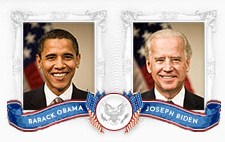
Corporations like AT&T may not be visible on television during the Republican and Democratic National Conventions, but they are throwing lavish parties and shaking hands behind the scenes. They’ll get their money’s worth later.
 Behind the scenes at both the Republican and Democratic National Conventions, AT&T is throwing secretive parties, handing out “schwag bags,” and engaging in a legal form of influence peddling to buy themselves goodwill with the eventual election winners.
Behind the scenes at both the Republican and Democratic National Conventions, AT&T is throwing secretive parties, handing out “schwag bags,” and engaging in a legal form of influence peddling to buy themselves goodwill with the eventual election winners.
The Republican National Convention held a week ago in Tampa, Fla. featured lavish, invitation-only parties for politicians attending the convention, sponsored quietly by AT&T.
AT&T went over the top at the Republican event, handing out goodie bags with stuffed elephants emblazoned with the company’s logo, convention pins, and other handouts designed to keep their name front and center with GOP movers and shakers. Tampa Bay Online found the phone company rented out one upscale, popular Tampa restaurant for the entire week, throwing expensive private parties for various state delegations.
The restaurant: Jackson’s Bistro, which locked the doors and turned its back on local regulars for the benefit of GOP high-rollers.
The sponsor: After digging, it turns out the money to rent the upscale eatery came from AT&T, but you wouldn’t know it from the restaurant owner and staff, which have been told to keep their mouths shut about who was paying for supper.
The sneaky: AT&T discovered it could easily navigate around loophole-ridden campaign finance laws which limit corporate-sponsored dinners, but have nothing much to say about “cocktail events.” So as long as diners are standing up while they munch, shake hands, and chat, it’s a-okay.
The mission: To get face time and establish goodwill with political movers and shakers. Feed them, toss them some AT&T flair, and let them know you will be calling on them soon. But no need to overdo it: AT&T can do more talking later… after the politicians get elected and the time is right to get the company’s agenda into the law books.
Keenan Steiner from the non-profit Sunlight Foundation says “this is where the seeds are planted for laws to be written in Washington and in state capitols all over the country.” He notes how important it is for both political parties to have the overwhelming corporate presence that most Americans never understand exists at both conventions:
The significance is, they wouldn’t be here, able to have a good time the whole time, without these corporations. It’s a sort of starting process to become dependent on these corporations. And in Washington, lawmakers require the about 100 lobbyists, over 20 lobbying firms that AT&T hires—they require the work of these folks to get their work done. They’re a sort of legislative subsidy. And they also require these corporations to get re-elected. They want to stay in office, and you better be friends with the Chamber of Commerce, with the NRA, with the big nonprofit groups, the shadowy nonprofit groups, that you really better be friends with them, because, if not, they could drop a lot of money in your district, and they could make you lose an election.

The Sunlight Foundation is tracking corporate money used to break bread and hand out cocktails to your lawmakers.
The Sunlight Foundation reports AT&T has been tilting toward the GOP: The contributions from AT&T’s PAC, employees and their family members to federal candidates total about $3 million for the 2012 cycle, with about two-thirds of the money going to Republican federal officeholders and candidates. Sunlight’s Political Party Time website helps break down where AT&T spends even more money wining and dining legislators.
The Michigan Republican delegation threw its kickoff party there Saturday night, which featured top state lawmakers. Guests at the event went home with a stuffed elephant with an AT&T logo, the Detroit News reported. AT&T also sponsored an Illinois delegation event there on Tuesday afternoon. The Chicago Sun-Times reported that the telecom giant is sponsoring the event, and events lists showed that the Illinois delegates was at Jackson’s that afternoon.
At this week’s Democratic National Convention at the Time Warner Cable Arena in Charlotte, N.C., AT&T’s Death Star logo isn’t hard to spot either.
Amidst the goodie bags and handouts from Indian tribes trying to secure lucrative casino laws, big pharmaceutical companies asking for special favors, and giant energy companies was once again: AT&T.
On Tuesday, Rep. Debbie Wasserman Schultz (D-Fla.), Democratic national chairwoman, lectured the Republicans about the influence of special interest cash at the Republican National Convention. She referred to the GOP affair as “last week’s special-interest funded, corporate-infused, backroom-deals, smoke-filled room, invitation-only affair that was held in my home state.”
Only the breakfast event where she made the remarks was bought and paid for by AT&T.
AT&T does not splurge on upscale dining for Democrats though. The party that largely opposed AT&T’s merger deal with T-Mobile and often supports Net Neutrality is making due with a far-smaller AT&T hospitality suite serving scrambled eggs and bagels at the inelegant Airport DoubleTree Inn, quite a step down from the Caramelized Diver Scallops and Red Snapper on the menu for the corporate-friendly GOP.
AT&T’s pervasive presence at the Charlotte convention is also upsetting union workers, who turned out in large numbers at the convention. Unionized employees are still fighting with AT&T for a new contract. Already uncomfortable in a state where union workers are virtually an endangered species (to add insult, unions were booked in non-unionized hotels), many were unprepared to feast at AT&T’s breakfast buffet.
“This is one breakfast I won’t be eating,” William Henderson, the president of Local 1298 of the Communications Workers of America told the CT Mirror. “I won’t eat their stuff.”
Only he didn’t say “stuff.”
[flv width=”640″ height=”380″]http://www.phillipdampier.com/video/William Henderson Boycotts ATT Breakfast.flv[/flv]
William Henderson, president of a Connecticut chapter of the Communications Workers of America, stands outside leafleting an AT&T-sponsored breakfast in Charlotte, N.C., displaying a bumper sticker: “AT&T=Greed.” (1 minute)
What should a good union worker with a gripe against AT&T do instead? Leaflet the event, to the great potential embarrassment of AT&T officials and Connecticut Democratic lawmakers holding a union grievance brochure in one hand and an AT&T coffee cup in the other.
The room eventually quieted down to listen to former Connecticut Sen. Chris Dodd make remarks… on behalf of the Motion Picture Association of America, who he now represents.
Despite the Snapper-Gap between the two political parties, you cannot miss AT&T in Charlotte. Although convention spokespeople officially refer to corporate sponsors as “providers,” AT&T’s corporate logo is “provided” on every last lanyard handed to delegates and journalists, right next to Barack Obama’s campaign logo.
In case you forgot to charge your cell phone, two AT&T officials are permanently on hand at a table near the entrance to the event offering free battery boosters. But don’t worry, they’ll get paid back for that goodwill later.
[flv width=”448″ height=”276″]http://www.phillipdampier.com/video/Party Time RNC Cash.flv[/flv]
Democracy Now talks with Sunlight Foundation’s Keenan Steiner who shares the secrets of corporate cash at the Republican National Convention in Tampa. (18 minutes)


 Subscribe
Subscribe










